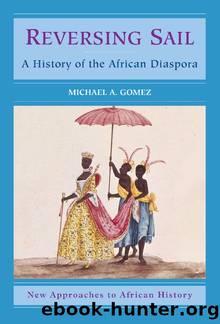Reversing Sail: A History of the African Diaspora (New Approaches to African History) by Michael A. Gomez

Author:Michael A. Gomez [Gomez, Michael A.]
Language: eng
Format: azw3
Publisher: Cambridge University Press
Published: 2004-12-05T16:00:00+00:00
FIGURE 5. Female slaves in Brazil, 1830s. From Jean Baptiste Debret, Voyage Pittoresque et Historique au Bresil (Paris, 1834–39), vol. 2, plate 22. Print Collection, Miriam and Ira D. Wallach Division of Art, Prints and Photographs, The New York Public Library, Astor, Lenox, and Tilden Foundations.
Ultimately, many problems flowing out of some fundamental predicament were related to the question of family. In the end, although some persons made decisions and conducted their lives as individuals, so many more proceeded out of a familial context. It was the African family, therefore, that informed the decision to resist, the modalities of that resistance, the when, where, how, and degree of that resistance. People acted in concert; they moved in groups; they fought in units. Some discussion of the family is therefore in order, before we turn our attention to other dimensions of resistance.
The literature on African families, as historical variables in transition, remains one of the least understood aspects of the heritage of the African Diaspora. There is a tendency to overgeneralize about “the African family,” glossing over important ethnolinguistic and even regional differences within Africa. Not all African families were matrilineal (tracing identity and inheritance through the female line); many were patrilineal, and some were bilineal. While polygyny was a possibility in West and West Central African societies, the likelihood of substantial numbers of men having more than one wife was small, since men needed time to build sufficient resources to support multiple wives and their children, which in turn usually meant that men were significantly older than the women they tended to marry, especially a second wife. This also meant that younger men did not always have access to women, given the hurdles of economic preparation and competition from older, established men. Polygyny was therefore a function of status in much of West and West Central Africa, its seeming continuation in the Americas more the result of New World circumstances than Old World traditions. That is, other factors influenced the formation of African families in the Americas. In fact, the disproportionate importation of males to females could only heighten feelings of frustration and competition.
Planters in the Caribbean and Latin America were for a long time unconcerned with the African family, or at least with the ability of the enslaved to replicate their numbers. To be certain, the Code Noir and the Siete Partidas contained provisions encouraging the maintenance of families, and with the support of the Catholic Church they discouraged the dismemberment of families through individual sales. Nevertheless, the reality on the ground was different; planters were solely concerned with the bottom line prior to 1790, when pressures to abolish the transatlantic slave trade forced them to enact measures more favorable to childbearing. New pronatalist policies were therefore embraced at the end of the eighteenth century, such as lightening the workloads of pregnant women as their time drew near and constructing special houses or plantation hospitals for expectant mothers; these efforts were less successful than envisioned.
A strategy to produce a self-sustaining, enslaved population was also adopted in North America.
Download
This site does not store any files on its server. We only index and link to content provided by other sites. Please contact the content providers to delete copyright contents if any and email us, we'll remove relevant links or contents immediately.
| Africa | Americas |
| Arctic & Antarctica | Asia |
| Australia & Oceania | Europe |
| Middle East | Russia |
| United States | World |
| Ancient Civilizations | Military |
| Historical Study & Educational Resources |
The Dawn of Everything by David Graeber & David Wengrow(1693)
The Bomber Mafia by Malcolm Gladwell(1620)
Facing the Mountain by Daniel James Brown(1546)
Submerged Prehistory by Benjamin Jonathan; & Clive Bonsall & Catriona Pickard & Anders Fischer(1452)
Wandering in Strange Lands by Morgan Jerkins(1419)
Tip Top by Bill James(1409)
Driving While Brown: Sheriff Joe Arpaio Versus the Latino Resistance by Terry Greene Sterling & Jude Joffe-Block(1369)
Red Roulette : An Insider's Story of Wealth, Power, Corruption, and Vengeance in Today's China (9781982156176) by Shum Desmond(1350)
Evil Geniuses: The Unmaking of America: A Recent History by Kurt Andersen(1346)
The Way of Fire and Ice: The Living Tradition of Norse Paganism by Ryan Smith(1326)
American Kompromat by Craig Unger(1307)
It Was All a Lie by Stuart Stevens;(1296)
F*cking History by The Captain(1289)
American Dreams by Unknown(1277)
Treasure Islands: Tax Havens and the Men who Stole the World by Nicholas Shaxson(1267)
Evil Geniuses by Kurt Andersen(1249)
White House Inc. by Dan Alexander(1207)
The First Conspiracy by Brad Meltzer & Josh Mensch(1167)
The Fifteen Biggest Lies about the Economy: And Everything Else the Right Doesn't Want You to Know about Taxes, Jobs, and Corporate America by Joshua Holland(1115)
